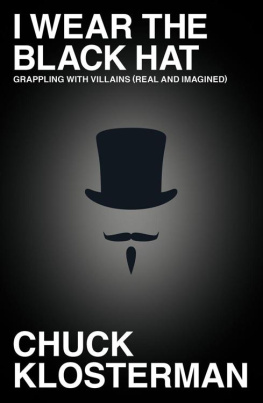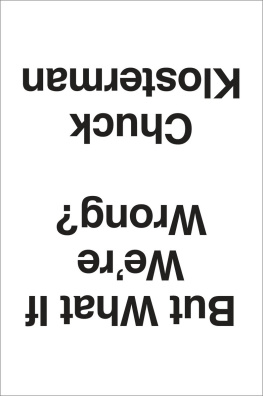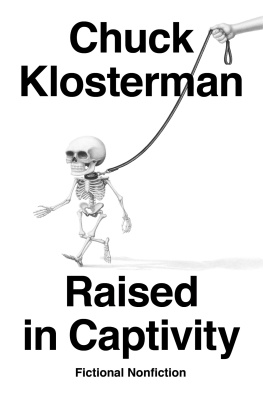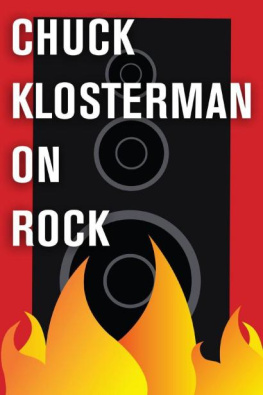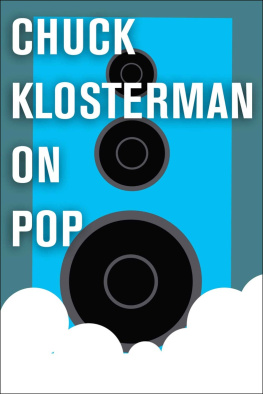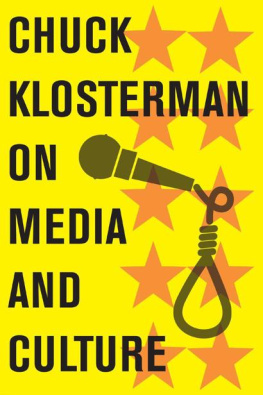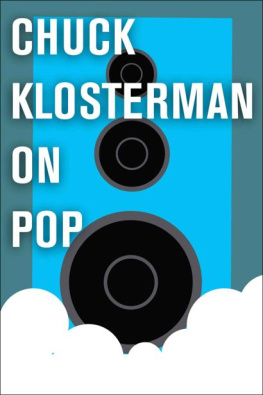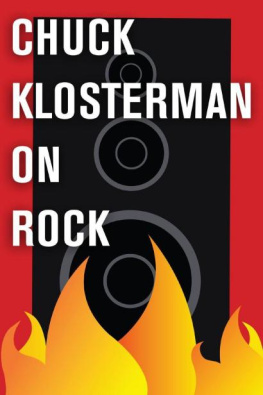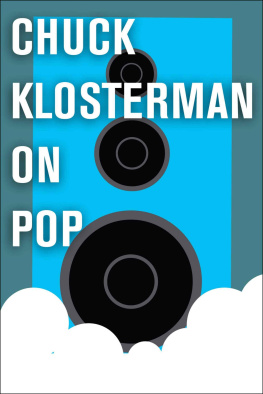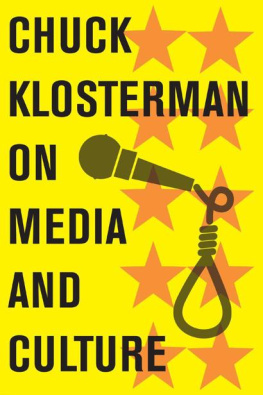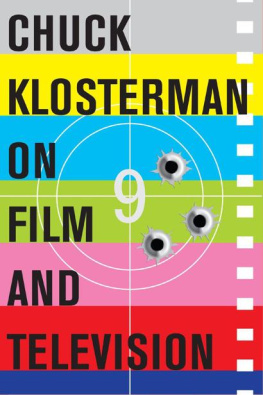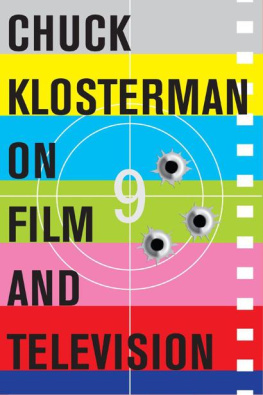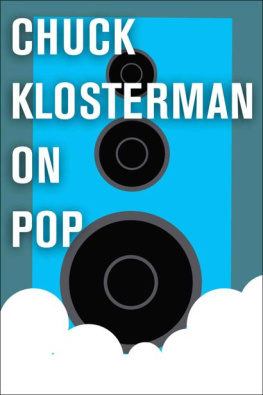Chuck Klosterman - ABBA 1, World 0. An Essay from Eating the Dinosaur
Here you can read online Chuck Klosterman - ABBA 1, World 0. An Essay from Eating the Dinosaur full text of the book (entire story) in english for free. Download pdf and epub, get meaning, cover and reviews about this ebook. year: 2009, publisher: Simon & Schuster;Scribner, genre: Religion. Description of the work, (preface) as well as reviews are available. Best literature library LitArk.com created for fans of good reading and offers a wide selection of genres:
Romance novel
Science fiction
Adventure
Detective
Science
History
Home and family
Prose
Art
Politics
Computer
Non-fiction
Religion
Business
Children
Humor
Choose a favorite category and find really read worthwhile books. Enjoy immersion in the world of imagination, feel the emotions of the characters or learn something new for yourself, make an fascinating discovery.

- Book:ABBA 1, World 0. An Essay from Eating the Dinosaur
- Author:
- Publisher:Simon & Schuster;Scribner
- Genre:
- Year:2009
- Rating:3 / 5
- Favourites:Add to favourites
- Your mark:
- 60
- 1
- 2
- 3
- 4
- 5
ABBA 1, World 0. An Essay from Eating the Dinosaur: summary, description and annotation
We offer to read an annotation, description, summary or preface (depends on what the author of the book "ABBA 1, World 0. An Essay from Eating the Dinosaur" wrote himself). If you haven't found the necessary information about the book — write in the comments, we will try to find it.
Originally collected in Eating the Dinosaur and now available both as a stand-alone essay and in the ebook collection Chuck Klosterman on Pop, this essay is about ABBA.
ABBA 1, World 0. An Essay from Eating the Dinosaur — read online for free the complete book (whole text) full work
Below is the text of the book, divided by pages. System saving the place of the last page read, allows you to conveniently read the book "ABBA 1, World 0. An Essay from Eating the Dinosaur" online for free, without having to search again every time where you left off. Put a bookmark, and you can go to the page where you finished reading at any time.
Font size:
Interval:
Bookmark:

An Essay from Eating the Dinosaur
Chuck Klosterman

Scribner
New York London Toronto Sydney

SCRIBNER
A Division of Simon & Schuster, Inc.
1230 Avenue of the Americas
New York, NY 10020
www.SimonandSchuster.com
This essay was previously published inEating the Dinosaur copyright 2009 by Chuck Klosterman.
All rights reserved, including the right to reproduce this book or portions thereof in any form whatsoever. For information address Scribner Subsidiary Rights Department, 1230 Avenue of the Americas, New York, NY 10020.
First Scribner ebook edition September 2010
SCRIBNER and design are registered trademarks of The Gale Group, Inc., used under license by Simon & Schuster, Inc., the publisher of this work.
For information about special discounts for bulk purchases, please contact Simon & Schuster Special Sales at 1-866-506-1949 or business@simonandschuster.com.
The Simon & Schuster Speakers Bureau can bring authors to your live event. For more information or to book an event contact the Simon & Schuster Speakers Bureau at 1-866-248-3049 or visit our website at www.simonspeakers.com.
Manufactured in the United States of America
ISBN 978-1-4516-2473-1
Sometimes its hard to tell if things that happened in your life only happened to you or if they happened to everyone. Every formative incident feels normal to the child who experiences it, so sometimes it takes twenty-five or thirty years to realize a particular event was singularly bizarre. For example, it took me a long time to recognize that being institutionally taught to dislike disco in my second-grade social studies class was deeply weirdunless, of course, this was a totally normal thing that happened to everybody in America who was born in 1972 and attended a public elementary school. I still cant tell.
Once or twice a month (and usually on a Friday), my social studies class would not read from our textbooks. Instead, we were given a publication called the Weekly Reader, which was like a newspaper for four-foot illiterates. It concisely covered the entire spectrum of current events, most notably the eruption of Mount St. Helens, the ongoing success of NASA, and whatever was supposedly happening in womens sports and national politics. For some reason, one of the exposs tackled by the Weekly Reader in autumn of 1980 was the rising unpopularity of disco, punctuated by Disco Demolition Night at Chicagos Comiskey Park during the summer of 79 (news cycles were slower in those days). Disco Demolition Night was a promotional event where a bunch of intoxicated baseball fans blew up Village People albums with dynamite in center field. Things, as they say, did not go smoothly. Thirty-nine people were arrested in the subsequent riot, which actually seems like an amazingly low number considering the stupidity of the original idea. There was an allusion to this in the Weekly Reader (or at least in the fake Weekly Reader Ive created in my memory), and it went on to explain how disco was this insidious, unserious social force. This story was evidently written to convince me and all my eight-year-old friends to continue playing kickball instead of frequenting discothques. Along with the article was a photograph of four people with comical pants and uncommitted expressions. They were described as The Disco Group ABBA: They were beards and teeth and natural breasts and whiteness. I suppose my feelings about them would be best described as mixed, inasmuch as I wasnt sure if they made me bored or hungry for cookies. Part of me still wonders if this actually happened. Maybe it took place during that academic year I was involved with the Dharma Initiative.
But nowobviouslyI am older. I have my own beard and my own comical pants, and I am sitting at a computer listening to The Winner Takes It All for the two hundredth or three hundredth or seven hundredth time, and I find myself continually shocked by how profoundly adult this song is. The chords are sonically limitless. The lyrics refer to judicial proceedings and express uncomfortably specific details about the end of love: I can think of no other pop song that examines the self-aware guilt one feels when talking to a person who has humanely obliterated your heart.
I dont wanna talk
If it makes you feel sad
And I understand
Youve come to shake my hand
I apologize
If it makes you feel bad
Seeing me so tense
No self-confidence
The message of The Winner Takes It All is straightforward: It argues that the concept of relationships ending on mutual terms is an emotional fallacy. One person is inevitably okay and the other is inevitably devastated. There is a loser who metaphorically stays and a winner who literally leaves, and the individual leaving takes everything with them. Like virtually all of ABBAs music, The Winner Takes It All was written by the two male members of the group, Bjrn Ulvaeus and Benny Andersson. The vocals were sung by Agnetha Faltskog (she was the blond one), who divorced Ulvaeus in 1979 after moving out of their home on Christmas night in 78. The Winner Takes It All was released as a single in 1980. Ulvaeus has claimed that the song is not an autobiographical depiction of his failed marriage to Faltskog, but thats hard to believe when one considers the original title of the song was The Story of My Life.
When thinking about ABBA, this is the song to think about.
When the eighties were over, Scandinavian ABBA historian Carl Magnus Palm wrote in 2001, it was clear that none of the former ABBA members had any relevance whatsoever in the international pop landscape. This statement isnt false, but its wrong. I suppose its true if you use the word relevance like most people who regularly write about music, but its false if you think about how the world actually operates. As a rule, people who classify art as irrelevant are trying to position themselves above the entity; its a way of pretending theyre more in step with contemporary culture than the artist himself, which is mostly a way of saying they cant find a tangible reason for disliking what something intends to embody. Moreover, the whole argument is self-defeating: If you classify something as irrelevant, youre (obviously) using it as a unit of comparison against whatever is relevant, so it (obviously) does have meaning and merit. Truly irrelevant art wouldnt even be part of the conversation.
Since at least 1979, AC/DC has been allegedly irrelevant. When the Knack and Nick Lowe were hot, Angus Young seemed oversexed and stupid. AC/DC was irrelevant in 1984 because they lacked the visual impact of less-heavy metal acts like Dokken, and they were irrelevant in 1989 because they werent releasing power ballads about teen suicide. They were irrelevant in 1991 because of grunge. They were irrelevant in 1997 because they werent involved with the mainstreaming of alternative culture. They were irrelevant in 2001 because they werent implementing elements of hip-hop into their metal. When they played Madison Square Garden in 2008, the always likeable New York Times critic Jon Caramanica opened his review like this: All the recent talk of how AC/DC is due for critical reappraisal? Ignore it. As far as I can tell, AC/DC has been irrelevant for the vast majority of their career. And this has played to their advantage. Judging the value of any band against the ephemeral tastes of the hyperpresent tense always misinterprets its actual significance. Moreover, any act lauded as especially relevant (and any critic1 preoccupied with hunting whomever thats supposed to be) is almost guaranteed to have a limited career, simply because so much of their alleged value is tied to an ephemeral modernity they only embody by chance. The reason AC/DC will leave a larger, deeper footprint than virtually all of their competition is because theyve never been relevant
Next pageFont size:
Interval:
Bookmark:
Similar books «ABBA 1, World 0. An Essay from Eating the Dinosaur»
Look at similar books to ABBA 1, World 0. An Essay from Eating the Dinosaur. We have selected literature similar in name and meaning in the hope of providing readers with more options to find new, interesting, not yet read works.
Discussion, reviews of the book ABBA 1, World 0. An Essay from Eating the Dinosaur and just readers' own opinions. Leave your comments, write what you think about the work, its meaning or the main characters. Specify what exactly you liked and what you didn't like, and why you think so.

